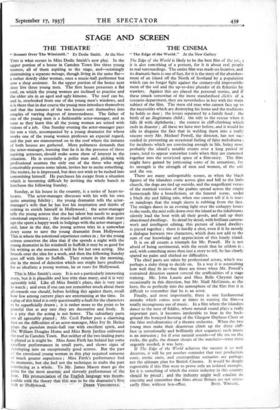STAGE AND SCREEN
THE THEATRE "
Bonnet Over The Windmill." Ey Dottie Smith. At the NeW
Tins is what occurs in Miss Dodie Smith's new play. In the upper portion of a house in Camden Town live three young women, all of them aspiring to the stage, and—seemingly Maintaining a separate menage, though living in the same flat— a rather dowdy older woman, once a music-hall performer but now a shop assistant. In the upper portion of the house next door live three young men. The first house possesses a flat roof, on which the young women are inclined to practise and the older sits in an aged and ugly kimono. The roof can be, and is, overlooked from one of the young men's windows, and it is there that in due course the young men introduce themselves and that the inmates of the two houses sort themselves into couples of varying degrees of interestedness. The father of one of the young men is a fashionable actor-manager, and as soon as they learn this all the young women are seized with visions of a job. One Sunday evening the actor-manager pays his 'son a visit, accompanied by a young dramatist for whose works one of the young women professes an especial regard, and the pair are manoeuvred on to the roof where the inmates of both houses are gathered. Mere politeness demands that the actor-manager, learning that he is in the presence of three aspiring actresses, should make some show of interest in the situation. He is essentially a polite man and, picking with professional acumen the only one of the three who might conceivably possess some talent,'invites her to recite something. She recites, he is impressed, but does not wish to be rushed into committing himself. He purchases his escape from a situation which is becoming difficult by inviting the whole bunch to luncheon the following Sunday.
Sunday, at his house in the country, is a series of heart-to- hearts. The actor-manager discusses with his wife his own quite amazing fidelity ; the young dramatist tells the actor- manager's wife that he has lost his inspiration and thinks of retiring to enrich himself in Hollywood ; the actor-manager tells the young actress that she has talent but needs to acquire emotional experience ; the music-hall artiste reveals that years ago she spent a happy week in lodgings with the actor-manager ; and, later in the day, the young actress tries in a somewhat dewy scene to save the young dramatist from Hollywood. This is where the emotional experience comes in ; for the young actress conceives the idea that if she spends a night with the young dramatist in his windmill in Suffolk it may be as good for his writing as she assumes it will be for her own acting. She broods over the idea for a week, and then the following Sunday goes off with him to Suffolk. They return in the morning, she in the mood of dejection which one might have predicted for so idealistic a young woman, he en route for Hollywood.
This is Miss Smith's story. It is not a particularly interesting story, but it is plauSible and less trite than many, and it is very agreeably told. Like all MisS Smith's plays, this is very easy to watch ; and even if one can not remember much about them afttrwardi one should; before holding this against them, recall how few among current plays are entertaining at the time. In a play of this kind it is only questionably a fault for the characters to be superficially drawn ; it is rather more to the point to be grateful that at any rate they are decorative and lively. It is a pity that the acting is not better. The subsidiary parts are all agreeably played ; Mr. Cecil .Parker puts a charming face on the difficulties of an actor-manager, Miss Ivy St. Helier plays the gisinukan' star with excellent Spirit, and Mr. Williant Donglai Home and Miss Betty Jardine enlivened the roof in Camden Town. But neither of the two leading parts is pTayed as it might be. Miss Anna Firth has behind her some excellent performances in small parts, and shows signs -of developing into an exceptionally good actress. But the part of the emotional .young woman in this play required someone of much greater .experience ; Miss. Firth's performance had its moments, but she, had not the technique to make the, part convincing as a whole.. To Mr. James . Mason must go the. Prize for the most anaemic and slovenly performance of the, Year. His pronunciation of the English language was incpm-. patible with the theory that this was to be the draMatist'S"firSt










































 Previous page
Previous page